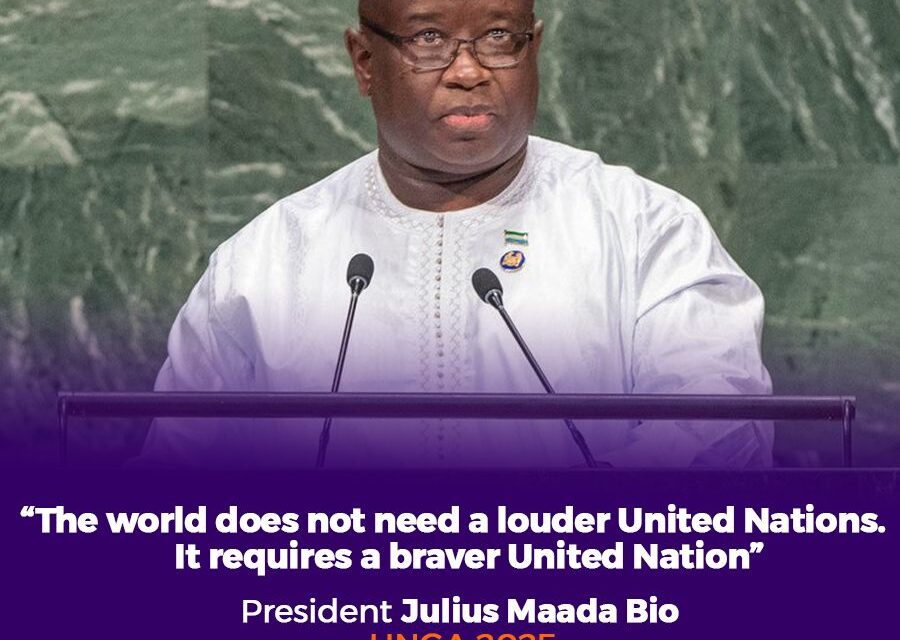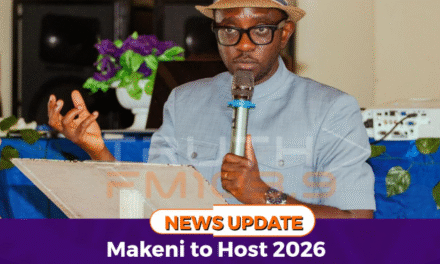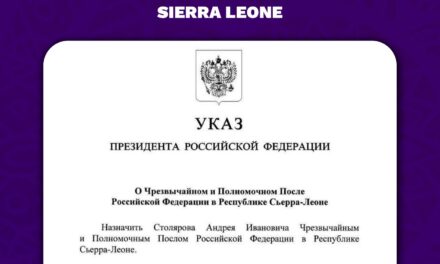UNGA, 2025-24th September- President Julius Maada Bio has renewed his call for urgent reform of the United Nations Security Council, demanding permanent representation for Africa and warning that continued exclusion undermines the Council’s credibility and global legitimacy.
Speaking at the United Nations General Assembly (UNGA) marking the UN’s 80th anniversary, President Bio, who also serves as Chair of the ECOWAS Authority and Coordinator of the African Union Committee of Ten on Security Council Reform, delivered a powerful appeal for equity and inclusion.
“Africa, home to 1.4 billion people and the largest regional bloc in the United Nations, has no permanent seat. This is unjust and untenable,” he declared. “It undermines the credibility of the Council and the legitimacy of its decisions.”
His remarks come as Sierra Leone continues its tenure as an elected member of the Security Council for 2024–2025, a position the president has used to spotlight urgent security challenges in West Africa and the Sahel, where terrorism and violent extremism continue to destabilize the region. “We have advocated for a comprehensive approach to counterterrorism in the Sahel, linking security with development,” he said. “But without Africa at the table, the Council cannot act decisively or contextually.”
President Bio emphasized that Africa’s demand is not symbolic. “This is not a request. It is a demand for equity. It is a test of the UN’s commitment to fairness and its own charter,” he said, referencing the Ezulwini Consensus and the Sirte Declaration, which call for at least two permanent seats for Africa with full rights and prerogatives, including the veto if retained, and two additional non-permanent seats.
During Sierra Leone’s presidency of the Security Council in August, the issue of African representation was given unprecedented prominence. President Bio urged the international community to seize the moment: “Let this be the time the world answers Africa’s call. Let us not pass on to the next generation a Security Council that fails to reflect the world as it is today.”
Beyond the UN, President Bio also reflected on his role within ECOWAS, highlighting recent regional engagements, including a second visit to Burkina Faso in two years, as part of efforts to build trust between ECOWAS member states and the Alliance of Sahelian States. He commended Burkina Faso’s leadership for its willingness to engage and expressed hope for continued dialogue with Mali and Niger.
He outlined ECOWAS priorities under his chairmanship, including defending democratic governance, operationalizing the ECOWAS Standby Force, implementing counterterrorism strategies, and advancing economic integration through trade liberalization and cross-border infrastructure. “Partnership with Africa must move from promise to practice,” he said.
President Bio concluded with a call for bold leadership at the global level. “The world does not need a louder United Nations. It requires a braver United Nations,” he said. “Let this anniversary be a turning point measured not in speeches, but in service, not in declarations, but in delivery.”
Sierra Leone, he affirmed, stands ready to lead with conviction, committed to principled multilateralism and the dignity of all peoples.









